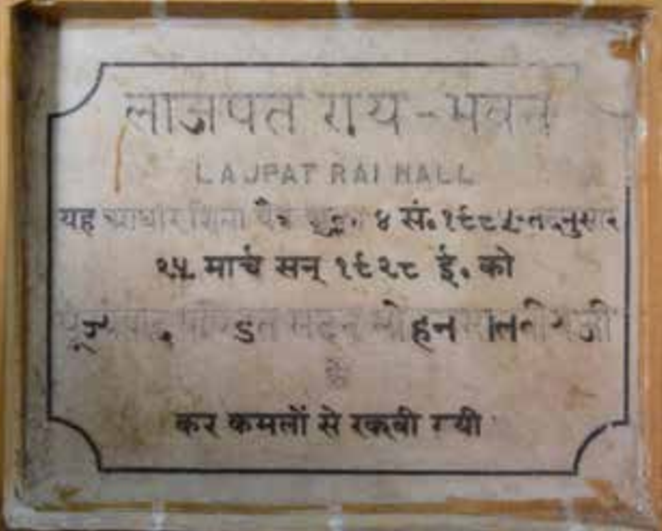.webp)
Saquib Salim
“Our emotions and passions cannot be understood from the standpoint of the society you live in. How can I tell Sita (Devi) to pressurise Vijya (Chauhan) to tender a written apology to the British government? It will be a shame for me. My Vijya is brave. She has no fear of prison and is happy there. Why are you worried?” This was the reply of Mrs. Vidyadhari Devi to the jail superintendent of Women’s Prison, Lahore when she asked her to convince her daughter Sita Devi (a freedom fighter) to pressurise her 13-year-old granddaughter Vijya to seek an apology from the government.
It was in 1942 when the Quit India Movement had shaken the foundations of the British Empire in India. In Lahore, the movement was led by the Congress workers associated with the Servants of People Society, founded by Lala Lajpat Rai in 1921.
On 8 August 1942, the Quit India Resolution was passed in Mumbai by Maulana Abul Kalam Azad led Congress under the guidance of Mahatma Gandhi. Soon after, police arrested prominent Congress workers from across India. Lahore, a hotbed of revolutionary activities, could not remain untouched.

Printing Press of Newspaper Bande Mataram
Police rounded up political activists and revolutionaries from Lala Lajpat Rai Bhawan, where many lived with their families. One of the most prominent arrests was of Sita Devi and her husband Chhabil Das. Sita led several movements in her life, serving as a Member of the Legislative Assembly in 1946 and a member of Parliament after the partition.
Chhabil was more famous as a nationalist who served as a Principal of National College, Lahore, and editor of the Urdu daily Bande Mataram, founded by Lala Lajpat Rai. Chhabil taught Bhagat Singh and worked closely with him on revolutionary activities as well.
On 8 August 1942, the couple was arrested as a safety measure by the British Government and sent to prisons in Lahore. They had four children - Vijya,12, Santosh, 10, Manorama, 8, and Ashok their only son was six years old. While going to the prison they asked Vijya to take care of siblings and inform her maternal and paternal grandmothers about their arrests.
Grandmothers came to live with the children. They were amazed to find that children were happy about the arrests of their parents and also dreamed of going to jail.
The family used to live on the first floor of Lala Lajpat Rai Bhawan and below them was the house of Lala Achint Ram. In the house revolutionaries of Naujawan Bharat Sabha used to hold meetings under the leadership of Krishna Kant.
Manorma later recalled, “Our elder sister Vijya, who was 13-year-old at that time, participated in these meetings and discussions of revolutionaries. Many times, while speaking her face would turn red with anger. After the meetings, she would pick pamphlets and hide them carefully to evade detection by the police. All the pamphlets contained political campaign of these revolutionary youths.”

The revamped plaque on the building
Vijya’s grandmothers did not like her taking part in revolutionary activities at such a tender age. The grannies were sympathetic to the cause of freedom but did not want their young girl to go to jail. Vijya was defiant. She became an active member of Naujawan Bharat Sabha.
Police raided the Bhawan once again and arrested Krishna Kant and several activists of the Sabha. It alarmed the old women and they decided to send Vijya to a boarding school.
Hoping to stop her revolutionary activities, Vijya was admitted to Hansraj Mahila College in the 7th standard. However, Vijya was a storm that blew everything in her path. The school sent complaints against her that she had converted school girls into nationalist political activists.
One day Vijya led 29 other girls, all older than her, in jumping the hostel walls. They came out on the roads and started a march raising the slogans of Inquilab Zindabad. All the girls were arrested. After facing pressure from parents, 28 girls submitted an apology to the government. Vijya and a girl named, Ram Pyari, would not tender an apology.
Vijya’s mother was already in the same Lahore prison and she expressed happiness at the arrest of her daughter. Vijya and Ram Pyari were sentenced to a jail term of six months in solitary confinement.
In her dark cell, Vijya would sing revolutionary songs in such a loud voice that other women prisoners would also join her. Two such songs mentioned by Manorma are: “Inquilab zindabad, Goonje azadi ka naad, Lathi goli sankat jail, Zalim ka hai antim khel, Inquilab zindabad” and “Azad karenge, Hind tujhe azad”
ALSO READ: I’m Assamese by heart and soul; neither majority nor minority: Padma Shri Imran Shah
Vijya was trained to be tough. Sita, her mother were lodged in the same jail as a political prisoner, but neither tried to meet each other. When people enquired about this indifference, Sita said she did not want Vijya to become weak.
